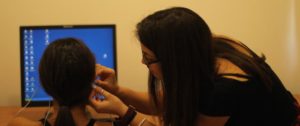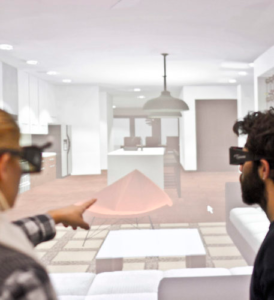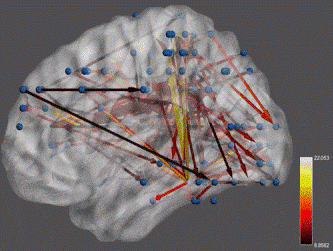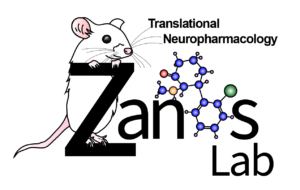
Neurocognitive Research Lab
Lead: Prof. Fofi Constantinidou
Scope: The team investigates cognitive aging and acquired brain conditions such as traumatic brain injury, stroke, mild cognitive impairment, dementia and more recently, post-acute COVID-19 syndrome, using neuroscience and neuropsychological research methodologies.
Activities: Understanding the neurophysiological underpinnings of conditions affecting brain health and the development of valid assessment and effective neuropsychological treatment methodologies integrating neurobehavioral, neuropsychological and brain stimulation paradigms.
Technologies & Methods: The group implements technologies to image the human brain including MRI (rFMRI, DTI, Structural) and EEG along with technologies to identify novel biomarkers such as FNIRs in activity and at rest. Non-invasive brain stimulation (tDCS, TES) is implemented to stimulate the human brain in conjunction with neuropsychological and behavioral measures and improve neuropsychological functioning.
Technology transfer includes the development of CAT-BRAIN, an innovative software rehabilitation platform based on the Categorization Program ©, a theory-based, established rehabilitation program designed to improve cognitive functioning in patients with acquired brain conditions.
Innovation spotlight: The Neurocognitive Study on Aging (NEUROAGE project, est. 2009), is the first longitudinal study on aging in Cyprus designed to identify predictors for healthy and pathological cognitive ageing. Implements advanced structural imaging studies to determine brain-behaviour relationships, genetic, biological, and health biomakers, along with demographic, sex/gender variables to examine modifiable and unmodifiable factors that contribute to neurobehavioral performance and cognitive health. NEUROAGE has recruited more than 1000 study participants to date tested every two years. Currently, the lab conducts a 12-year follow up.

Clinical Psychology and Psychophysiology Lab
Lead: Prof. Georgia Panayiotou
Scope: Emotion processes and emotion regulation and coping in psychopathology, health and life.
Activities: Studies compatible with trans-diagnostic conceptualizations of psychopathology, focusing on the multimethod examination of basic neurobehavioral systems involved in the aetiology of disorders. Valence, arousal and regulatory processes are examined among others.
Technologies & Methods: Psychophysiology methods assess emotion, especially the startle reflex, autonomic physiology and facial EMG, various paradigms to induce emotion, such as imagery, VR, pictures and films. EEG, eye-tracking, and biological markers of stress are used in addition to peripheral psychophysiology and self-report methods. Randomized Control Trials, informed by qualitative investigations are also used to test new interventions, especially focused on prevention and the development of socio-emotional skills. Interactions among emotion, cognition (attention biases, inhibition) and personality are also addressed.
Innovation spotlight: Examines individual differences in emotional reactivity, implicit and explicit emotion regulation processes and how these contribute to internalizing and externalizing disorders, as well as social problems like substance addition, gambling, school aggression and risky driving. More recently we have examined how socio-emotional skills, like emotion regulation, values clarification and communication skills can contribute to mental health and prevent difficulties.
For more information please visit Clinical Psychology and Psychophysiology Lab’s website.

Learning Disabilities Group
Lead: Prof. Timothy C. Papadopoulos
Scope: The Learning Disabilities Group (LDG) investigates the neurodevelopmental risk factors and optimal predictors for prevalent pediatric conditions such as reading difficulties, attention deficit, and language impairments.
Activities:
- The LDG analyzes various reading, language performance, executive functions, and intelligence concepts. It also measures these constructs to understand better how they relate to one another.
- The LDG combines neurophysiological and eye-movement data to examine how young learners process information when they read.
- The LDG develops and tests different intervention methods to help treat reading difficulties and attention deficits.
Technologies & Methods:
The Learning Disabilities Group uses innovative methods to diagnose and treat relevant conditions. It has established the reliability and validity of primary cognitive and linguistic batteries to assess various skills related to identifying Specific Learning Disorders (SLD). The LDG also investigates the possible neurological basis of children with language and reading disabilities using eye-tracking and electrophysiological methodologies (event-related potentials; ERPs / fixation-related potentials; FRPs). Finally, the Learning Disabilities Group examines the relationship between fluid intelligence and language ability by recording the ERPs of childhood populations varying in age and ability.
Innovation spotlight:
The LD Group integrates cognitive assessments with neurophysiological and eye-tracking data to study the developmental learning stages of groups and individuals and personalize interventions for children with learning disabilities. The LD Group leverages cutting-edge technologies and research in pediatric neurodevelopment to enhance the efficacy of cognitive remediation.

Language and Cognitive Development Research Group
Lead: Prof. George Spanoudis
Scope: Our research spans across various aspects of cognitive development, including:
- Core cognitive skills: We explore the development of fundamental cognitive abilities like attention, memory, problem-solving, and executive function.
- Correlates of developing intelligence: We investigate the neural and behavioral factors associated with the emergence and refinement of intelligence throughout childhood and adolescence.
- Developmental language disorders: We focus on understanding the underlying cognitive and neural mechanisms contributing to various language impairments in children.
Activities: The Lab actively engages in the following research activities:
- Conducting studies on typical and atypical populations: We compare and contrast the developmental trajectories of children with and without developmental language disorders.
- Investigating language processing and learning: We explore how children acquire and utilize language skills, including vocabulary development and sentence construction.
- Exploring Theory of Mind development: We study how children understand the mental states of others, including their thoughts, emotions, and intentions.
- Developing novel theoretical models: We create frameworks to explain the complex processes underlying cognitive development in children.
- Validating and refining models using neuroimaging: We utilize EEG/ERP techniques to understand the neural correlates of cognitive and language development.
The Language & Cognitive Development Research Group employs a diverse range of methodologies to investigate various aspects of cognitive and language development. We leverage both established and innovative approaches to gain a comprehensive understanding of these complex processes.
Technology & Methods:
Traditional Behavioral Measures:
- In recognition of the valuable insights offered by behavioral assessments, our lab continues to utilize established behavioral measures. These may include standardized tests, reaction time tasks, and eye-tracking, allowing us to assess cognitive skills, learning abilities, and various aspects of language processing.
Advanced Electrophysiological Techniques:
Building upon the foundation of behavioral measures, our lab has significantly expanded its methodological repertoire by incorporating advanced electrophysiological techniques:
- Electroencephalography (EEG): This non-invasive technique measures the electrical activity of the brain generated by large groups of neurons. By analyzing EEG recordings, we can gain valuable insights into the temporal dynamics of brain activity during various cognitive tasks.
- Event-related potentials (ERPs): This advanced EEG analysis technique focuses on specific brain responses elicited by specific stimuli or events within a task. By analyzing ERPs, we can identify the neural signatures of different cognitive processes involved in language and cognitive development.
The integration of behavioral and electrophysiological methodologies allows us to:
- Triangulate findings: By utilizing a range of different measures, we can corroborate and strengthen our understanding of cognitive and language development.
- Gain deeper insights: EEG and ERPs offer unique insights into the temporal dynamics of brain activity, complementing the information gleaned from behavioral measures.
- Explore the neural basis of behavior: By linking behavioral performance with specific brain activity patterns, we can gain valuable insights into the underlying neural mechanisms supporting cognitive and language development.
This combined approach allows our lab to conduct comprehensive investigations, bridging the gap between behavioral observations and their underlying neural correlates in children and adolescents.
Innovation Spotlight:
The Lab distinguishes itself by:
- Developing novel theoretical frameworks: We create innovative models to explain the intricate pathways of cognitive development.
- Integrating these models with neuroimaging data: We directly connect our theoretical models to data obtained through advanced neuroimaging techniques, allowing for a robust and comprehensive understanding of cognitive development.
- Focusing on developmental language disorders: We aim to shed light on the specific cognitive and neural mechanisms associated with these challenges, paving the way for improved diagnosis and intervention strategies.

Experimental Psychology Lab
Lead: Prof. Marios Avraamides
Activities: Basic and applied research on cognitive mechanisms, with emphasis on memory, attention, perception, and, as of recent, on the role of cognition in sports. The lab employs post-docs, technicians, and several Ph.D./MA and undergraduate students that work on a variety of projects.
Technologies & Methods: Virtual Reality, Eye-tracking, and Electroencephalography
Innovation spotlight: Research from the lab has inspired the formation of 3 startups, namely Silversky3D Virtual Reality Technologies Ltd, MentisVR Ltd, and Immerseav Ltd. All three companies carry out research and the development related to Virtual Reality and human cognition.
For more information visit the EPL’s website.

Cognitive Neuroscience and Functional Neuroimaging Lab
Lead: Dr. Evangelos Paraskevopoulos
Scope: The lab focuses on linking the functionality of the cortex, in terms of source activation patterns and functional/effective connectivity, with perceptual and cognitive processes. Computational approaches in data analysis and translational applications of basic research in cognitive neuroscience complete its scope.
Activities: Studies on cortical plasticity throughout the lifespan, complex and multilayer brain networks, music perception (disorders), multisensory integration, and pathologies related to audition such as tinnitus.
Technologies & Methods: To answer the scope of the lab, we use behavioral and cognitive measurements along with electroencephalographic and magnetoencephalographic recordings. Data analysis methods link the behavioral and cognitive functioning to functional neuroimaging of source activity, functional and effective connectivity analyses and multilayered networks modeling.
Innovation spotlight: Develops innovative pipelines for M/EEG data analysis, supporting the generation of new knowledge and tools for understanding the link between cognitive and cortical functioning.

Translational Neuropharmacology Lab
Lead: Dr. Panos Zanos, BSc, Ph.D.
Scope: This dynamic interdisciplinary team in Nicosia, Cyprus, focuses on unraveling the complexities of brain diseases, particularly neurodegenerative, neurodevelopmental, and neuropsychiatric disorders. Their pioneering work in drug repurposing, especially with ketamine, is transforming the treatment landscape for major depressive disorders and opioid use disorders.
Activities: The lab integrates experimental techniques (in vitro, ex vivo, and in vivo rodent models) with bioinformatics methodologies and genetic epidemiology to explore novel therapies. They are conducting Cyprus’s first-ever drug-interventional clinical trial, repurposing the anesthetic drug ketamine for treating opioid use disorders (EudraCT: 2022-001997-70).
Technologies & Methods: The team employs a wide array of methodologies across three research units:
- Translational Neuropharmacology: Utilizes in vitro, ex vivo, and in vivo rodent models to study brain diseases.
- Clinical Neuropsychopharmacology: Conducts clinical trials, like the ketamine study for opioid use disorders.
- Systems Bioinformatics: Applies bioinformatics methodologies and genetic epidemiology to understand disease complexities.
Technology transfer includes the groundbreaking use of ketamine metabolites as rapid-acting antidepressants. Dr. Zanos’s discovery of (2R,6R)-hydroxynorketamine’s efficacy has led to a phase I clinical trial (ClinicalTrials.gov: NCT04711005) in collaboration with the National Institute of Mental Health, with a phase II trial on the horizon.
Innovation spotlight: Dr. Zanos’s research on ketamine metabolites offers a solution to critical problems in depression treatment, providing rapid-acting effects without harmful side effects. His work on oxytocin’s role in drug addiction has initiated a human clinical trial for opioid addiction. Additionally, his studies on receptor interactions, genetic vulnerabilities, and sleep disorders are enhancing our understanding of complex mental health conditions. With over €1.250,000 in competitive grants, 65+ peer-reviewed articles in prestigious journals, and over 5900 citations, Dr. Zanos’s lab is at the forefront of transformative discoveries in neuropharmacology.
For more information visit the Translational Neuropharmacology Lab website





